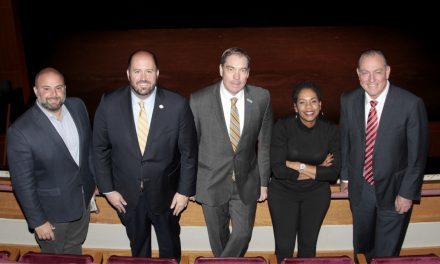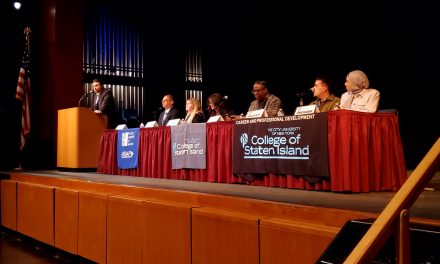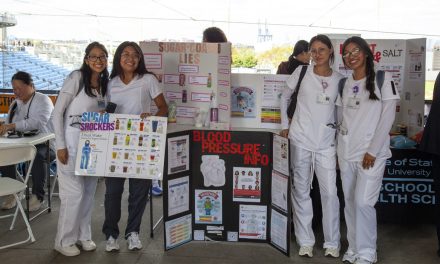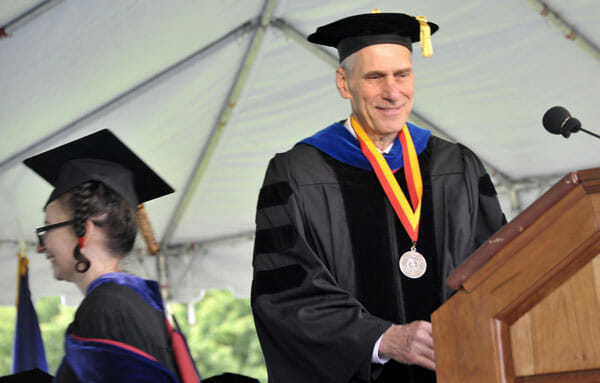
Provost and Senior Vice President for Academic Affairs Gary Reichard awarding degrees at commencement in 2017.
Is the American republic headed for collapse?
“Potentially,” says Provost and Senior Vice President for Academic Affairs Gary Reichard. “There’s been a swirling downward of public trust in government over the last several decades. It’s certainly as bad as I’ve seen it during my lifetime.”
Reichard’s views are hardly casual – he is, after all, a political historian who has written well-received books about American political history. His own work in politics early in his career included working as a speechwriter for Dick Celeste, an Ohio Democrat who also worked as a university administrator after serving in the House of Representatives and as governor of his home state.
Reichard spoke recently about his upcoming Dean’s Symposium address – Tuesday, Oct. 9, at 2:30 in the Lecture Hall in the Center for the Performing Arts – with some consternation.
“I’m not looking forward to speaking publicly about this subject, things are so bad,” he said with a genuine look of worry. “It’s a unique and frightening time.”
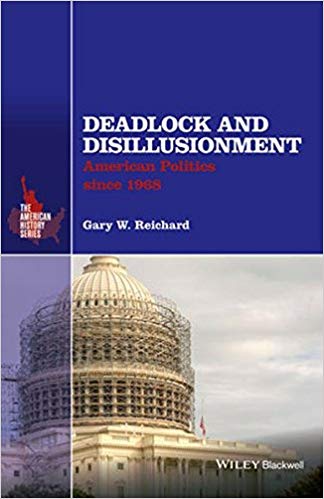
Reichard's 2016 book, Deadlock and Disillusionment: American politics since 1968, has been well-received critically and popularly.
Reichard’s address will be based on his 2016 book, Deadlock and Disillusionment: American Politics Since 1968. In it, he traced the contours of the decline in political discourse and trust in government from Nixon onwards. And though he did not try to predict the 2016 race – the book came out in February of that year – he believes the election and current state of affairs confirm its premise and conclusions.
“In one sense, I can say, ‘I told you so,’ but as a citizen, it’s deeply concerning,” he said. “In a general sense, we’re approaching crisis stage.”
The Watergate scandal that led to Nixon’s resignation marked the beginning of a decline in public trust in government that has continued to today.
“The Nixon years saw the arrival of the politics of cynicism,” the provost said. “It would be briefly countered by the advent of the Reagan era, to some degree due to his sunny personality. But at the end, with Iran-Contra, a widespread feeling re-emerged that you can’t trust anything the government does. Political hardball on both sides during the Clinton years only worsened the situation.”
For Reichard, the issue is not only who the president may be; although the tone set by the White House is influential, the problem is deeper. Partisanship in the media is a big factor, Reichard added.
“If Hillary Clinton had won, we’d probably not be much better off, as she was as polarizing as President Trump,” Reichard said. “And all the distrust and discord are amplified by social media. We need to find a way to turn around and go back the other direction.”
Whether the country can is unclear, he said.
“I think we are near a breaking point,” Reichard said. “Up to the point of Clinton’s impeachment, you could still have the sense that (Republicans and Democrats) could cooperate when they had to. But the dysfunction has grown dramatically.”
The answer is for people to recognize that the very system of American government is now at risk.
“I think we face a genuine risk,” Reichard said. “The solution is for people to care. The government needs to represent all of the people. The only hope I have is that people who go to the polls won’t just vote for partisan positions. We need the huge numbers of voters closer to the middle of the political spectrum to cast their votes more from an interest in saving our system than to advance an ideological agenda.”
“We’ve always been divided, that’s our history,” Reichard continued. “We’re mostly a country that revolves around the middle. I’m hoping particularly that young people will understand that their future is very much affected by the survival of our system of government.”

